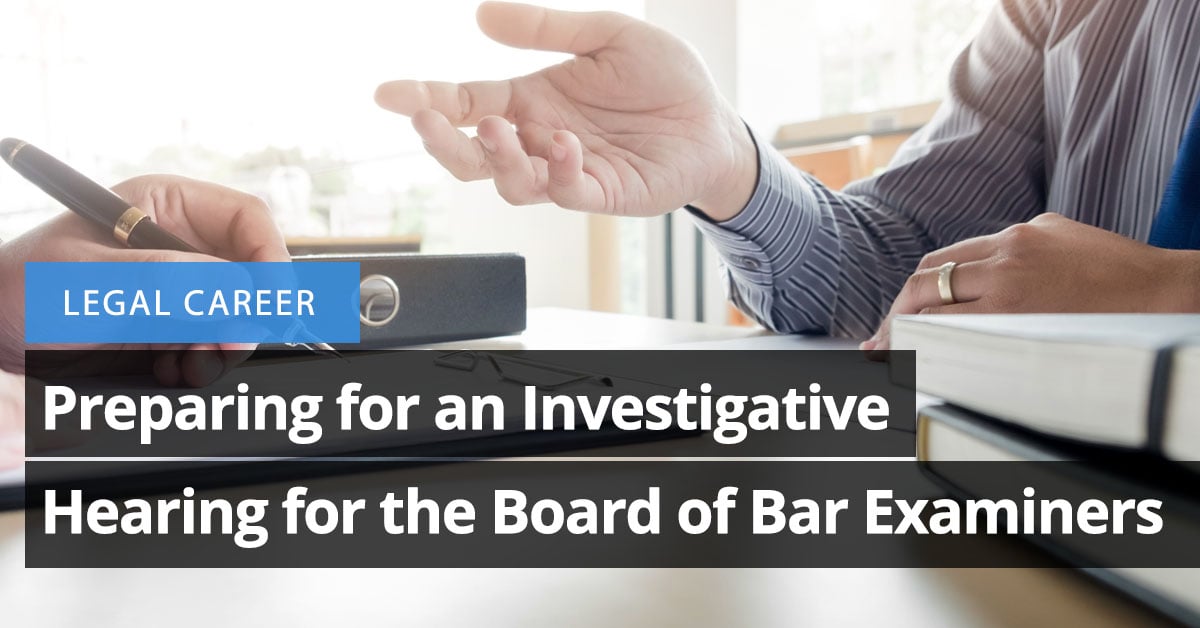 The Florida Board of Bar Examiners has just notified you that you are set to undergo an investigative hearing. It is important to understand what an investigative hearing is and how you became subject to it.
The Florida Board of Bar Examiners has just notified you that you are set to undergo an investigative hearing. It is important to understand what an investigative hearing is and how you became subject to it.
Back at the turn of the last century, the purpose of these screenings was to prevent anyone who wasn’t in the mainstream from becoming an attorney. At that time, people were denied entrance into the legal profession due to race, class, or ethnicity. During the 1950s and 1960s, people were also denied if they were affiliated with the Communist Party. In today’s age, the bar of examiners instead focuses on conduct.
To avoid an investigative hearing before the board of examiners, disclose everything – even the most remote, seemingly trivial information. Far better to over-prepare than to be caught short.
If you do find yourself in an investigative hearing, prepare for it as if it is your first trial. Again, being overly prepared is much better than not being as prepared as you possibly can. There are three things that can happen at the end of the board of examiners’ investigative hearing: denial of entrance into the bar, a formal hearing, or the imposition of proposed settlements such as community service hours or required writing of a brief. To show your commitment to righting past wrongs, it is best to perform service hours and write a brief ahead of the investigative hearing.
Character and Fitness Section of the Investigative Hearing
In Florida, investigative hearings are held to determine whether an applicant should be admitted to the bar notwithstanding past conduct. Disqualifying conduct includes the following:
- unlawful conduct;
- academic misconduct;
- making or procuring any false or misleading statement or omission of relevant information, including any false or misleading statement or omission on the Bar Application, or any amendment, or in any testimony or sworn statement submitted to the board;
- misconduct in employment;
- acts involving dishonesty, fraud, deceit, or misrepresentation;
- abuse of legal process;
- financial irresponsibility;
- neglect of professional obligations;
- violation of an order of a court;
- evidence of mental or emotional instability;
- evidence of drug or alcohol dependency;
- denial of admission to the bar in another jurisdiction on character and fitness grounds;
- disciplinary action by a lawyer disciplinary agency or other professional disciplinary agency of any jurisdiction; or
- any other conduct that reflects adversely on the character or fitness of the applicant.
The most damaging mistake is not acting with complete candor. This includes not acting with forthrightness on the bar application as well as on a law school application, a driver’s license form, or other forms of legal information-gathering tools. During a background investigation, make no mistake: the bar of examiners will uncover dishonesty. Behavior without honesty will get an applicant pulled in front of an investigative hearing.
As for the question of bringing in character witnesses to testify in front of the board of examiners, it is customary to submit letter support of affidavits instead. This takes up less time during the hearing, for which the board of examiners will be grateful.
Preparation Guide for an Investigative Hearing
- Before you submit your application, it’s a good idea to perform an extensive background check on yourself. Talk to friends, acquaintances old and new, family, and employers past and present.
- You can check your employment history through the social security administration’s office. This will help you put your timelines in order.
- Pull your credit reports from all three reporting agencies. Be sure there aren’t any nasty surprises that will cause the board of examiners to take a closer look.
- Make sure you are upfront and honest with creditors or put those issues in order before you submit your application. It should be noted that you can have debt; the key is not to be dishonest with your creditors.
Upon being called before the board of examiners for an investigative hearing, gather all pertinent documents. These may be documents in your possession, the board of examiners’ possession, or a third party’s possession.
Conclusion
Basically, if you’ve been called before the board for an investigative hearing, determine the issues that caused the board to have an issue with you, correct the error that you made as much as possible, and show remorse in the form of voluntary community services hours and an extensive legal brief. You want to be sure the board is clear that regardless of your past, you have become an honorable citizen who can conduct him- or herself with professional conduct and will make a fine addition to the Florida Bar.




